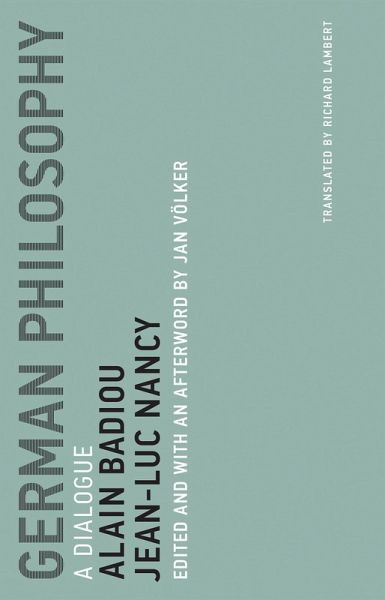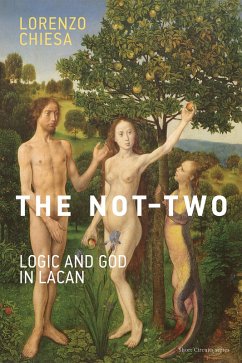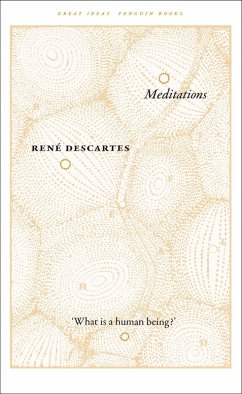
German Philosophy (eBook, ePUB)
A Dialogue
Redaktion: Volker, Jan
Versandkostenfrei!
Sofort per Download lieferbar
13,95 €
inkl. MwSt.
Weitere Ausgaben:

PAYBACK Punkte
7 °P sammeln!
Two eminent French philosophers discuss German philosophyincluding the legacy of Kant, Hegel, Nietzsche, Adorno, Fichte, Marx, and Heideggerfrom a French perspective.In this book, Alain Badiou and Jean-Luc Nancy, the two most important living philosophers in France, discuss German philosophy from a French perspective. Written in the form of a dialogue, and revised and expanded from a 2016 conversation between the two philosophers at the Universität der Künste Berlin, the book offers not only Badiou's and Nancy's reinterpretations of German philosophers and philosophical concepts, but also an...
Two eminent French philosophers discuss German philosophyincluding the legacy of Kant, Hegel, Nietzsche, Adorno, Fichte, Marx, and Heideggerfrom a French perspective.
In this book, Alain Badiou and Jean-Luc Nancy, the two most important living philosophers in France, discuss German philosophy from a French perspective. Written in the form of a dialogue, and revised and expanded from a 2016 conversation between the two philosophers at the Universität der Künste Berlin, the book offers not only Badiou's and Nancy's reinterpretations of German philosophers and philosophical concepts, but also an accessible introduction to the greatest thinkers of German philosophy. Badiou and Nancy discuss and debate such topics as the legacies of Kant, Hegel, and Marx, as well as Nietzsche, Adorno, Fichte, Schelling, and the unavoidable problem of Heidegger and Nazism. The dialogue is contentious, friendly, and often quotable, with strongat times passionatepositions taken by both Badiou and Nancy, who find themselves disagreeing over Kant, for example, and in unexpected agreement on Marx, for another.
What does it mean, then, to conduct a dialogue on German philosophy from a French perspective? As volume editor Jan Völker observes, German philosophy and French philosophy describe complex constellations that, despite the reference to nation-states and languages, above all encompass shared concepts and problemsalthough these take a range of forms. Perhaps they can reveal their essential import only in translation.
In this book, Alain Badiou and Jean-Luc Nancy, the two most important living philosophers in France, discuss German philosophy from a French perspective. Written in the form of a dialogue, and revised and expanded from a 2016 conversation between the two philosophers at the Universität der Künste Berlin, the book offers not only Badiou's and Nancy's reinterpretations of German philosophers and philosophical concepts, but also an accessible introduction to the greatest thinkers of German philosophy. Badiou and Nancy discuss and debate such topics as the legacies of Kant, Hegel, and Marx, as well as Nietzsche, Adorno, Fichte, Schelling, and the unavoidable problem of Heidegger and Nazism. The dialogue is contentious, friendly, and often quotable, with strongat times passionatepositions taken by both Badiou and Nancy, who find themselves disagreeing over Kant, for example, and in unexpected agreement on Marx, for another.
What does it mean, then, to conduct a dialogue on German philosophy from a French perspective? As volume editor Jan Völker observes, German philosophy and French philosophy describe complex constellations that, despite the reference to nation-states and languages, above all encompass shared concepts and problemsalthough these take a range of forms. Perhaps they can reveal their essential import only in translation.
Dieser Download kann aus rechtlichen Gründen nur mit Rechnungsadresse in A, B, BG, CY, CZ, D, DK, EW, E, FIN, F, GR, HR, H, IRL, I, LT, L, LR, M, NL, PL, P, R, S, SLO, SK ausgeliefert werden.













